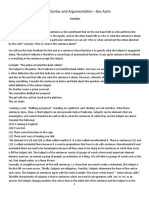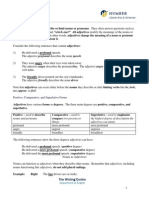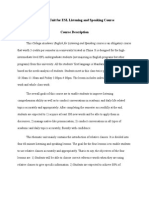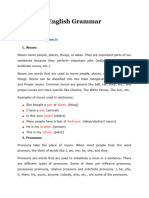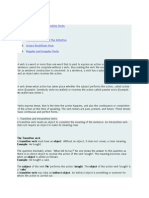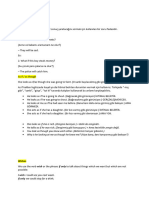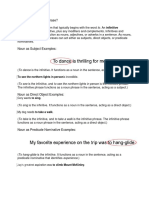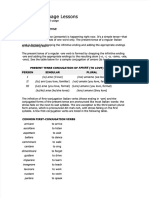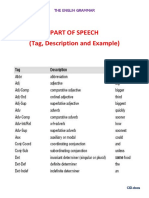Catenative Verbs
Catenative Verbs
Uploaded by
Milan KostadinovicCopyright:
Available Formats
Catenative Verbs
Catenative Verbs
Uploaded by
Milan KostadinovicOriginal Description:
Original Title
Copyright
Available Formats
Share this document
Did you find this document useful?
Is this content inappropriate?
Copyright:
Available Formats
Catenative Verbs
Catenative Verbs
Uploaded by
Milan KostadinovicCopyright:
Available Formats
A catenative verb (also called a chain verb) takes a nonfinite clause as its complement.
"A catenative verb is a verb that controls a non-finite complement. 'Catenative' means
'chaining' and reflects the way that the verb can link recursively with other catenatives to form
a chain, as in:
We decided to try to rent a house near the sea.
Here there is a chain of three verbs: decide, try and rent, with to try to rent a house near the
sea functioning as the catenative complement of decide, and to rent a house near the
seafunctioning as the catenative complement of try."
(Angela Downing, English Grammar: A University Course. Routledge, 2006)
ETYMOLOGY
late 20th century: from Latin catena 'chain'
"The term 'catenative' is derived from the Latin word for 'chain,' for the construction is
repeatable in a way that enables us to form chains of verbs in which all except the last have a
non-finite complement:
She seems to want to stop trying to avoid meeting him.
Each of the italicized verbs here has a non-finite clause as complement."
"All our discontents about what we want appeared to spring from the want of thankfulness for
what we have."
(Daniel Defoe)
Catenative verbs are verbs which can be followed directly by another verb variously
in the to-infinitive, bare infinitive or present participle/gerund forms. For
example He deserves to win the cup, where deserve is a catenative verb which can be
followed directly by another verb, in this case in the to-infinitive form.
Most of these verbs demand that the following verb be in one or the other form only. A
few can take both forms, but sometimes there is a difference in meaning.
If you are thinking of adding to this list, it is most important to distinguish between a real
catenative verb, such as decide I decided to work. and a normal verb followed by
aninfinitive of purpose (French: pour) or a descriptive gerund. A good example of a non-
catenative verb that could easily be confused is leave where I left to work is in
reality I left (home), followed by a purpose, To go to, or do, some work. A descriptive
gerund example: She left crying. is in reality a description meaning She left and at the
same time she was crying.
afford
At last I can afford to buy a new car.
agree
He agreed to work on Saturday.
aim
We aim to pleaseall our clients.
appear
I appear to have forgotten my glasses.
In the passive voice followed by a to-infinitive
Note These verbs are not found in catenative form with to-infinitive except in the passive voice, as they place the object between the two verbs when used actively.
allowed
You are allowed to wear jeans here.
forbid
You are forbidden to smokein here.
permit
But you are permitted to smokein here.
request
You are requested to leaveimmediately.
require
You are required to leavenow.
Followed by a gerund
admit
He admitted taking the money.
advise
I advise leaving immediately.
allow
We do not allow smoking here.
appreciate
I would appreciate receiving more help with this.
avoid
Please avoid touching the goods on display.
Followed by a to-infinitive
Followed by a to-infinitive or a gerund
No difference in meaning
bear
Note This verb is most commonly found in the form can bear/cant bear.
I cant bear to hear him sing.
I cant bear hearing him sing.
begin
It began to rain.
It began raining.
Difference in meaning
come
I came to realisethat things were not as they seemed. (I underwent a slow realisation.)
I asked her to come dancing (I invited her.)
go
They went to seea movie. (That is why they went.)*
They have gone fishing. (Go is used with sports activities ending -ing.)
go on
After a long career Ken went on to bea manager. (He changed to a different more prestigious activity.)
Some goalkeepers go on playing until they are 40. (They continue doing the same activity.)
go round/ go around
He went (a)round to seeif she was OK. (He went to one place.)*
He went (a)round saying terrible things about her. (He went to lots of different places [while] saying terrible things about her.)
get
Followed by a bare infinitive
dare
Note This is considered a semi-modal auxiliary verb. Particularly in negative, the modal form is preferred.
He darent climb the tree.
He didnt dare to climb the tree.
He didnt dare climb the tree.
help
Note The to is optional.
I helped to pack her bags.
I helped pack her bags.
go / come
Note This is most common in American English. In other varieties, and is generally inserted between the two words.
Come and go are not used this way except in their bare forms, ie, not *He went/camesit with her. or *He goes/comes sit with her. or *He is going/coming sit with
her.or *He had gone/comesit with her.
Go clean your room.
Go and clean your room.
I cant go watch that movie.
I cant go and watch that movie.
Comesit with me.
Comeand sit with me.
Followed by "and"
Expressions such as Go and clean your room and Try and do better are often analyzed
as hendiadys, the figure of speech in which one "substitutes conjunction for subordination".
You might also like
- There Are Two Types of Relative Clauses, Defining and Non-Defining. in The Grammar Chart Below, You Can See The Main Differences Between ThemDocument7 pagesThere Are Two Types of Relative Clauses, Defining and Non-Defining. in The Grammar Chart Below, You Can See The Main Differences Between ThemMarbelly MadrizNo ratings yet
- The Nuts and Bolts of Arabic English PDFDocument341 pagesThe Nuts and Bolts of Arabic English PDFAli Muhammad YousifNo ratings yet
- 09 Chapter 3 PDFDocument40 pages09 Chapter 3 PDFVinayak TreanpnkerNo ratings yet
- English Syntax and ArgumentationDocument5 pagesEnglish Syntax and ArgumentationRooNo ratings yet
- Adjectives PDFDocument3 pagesAdjectives PDFDavid OrtizNo ratings yet
- Adjective ClausesDocument11 pagesAdjective ClausesRasyidhakimNo ratings yet
- From Phrases To ClausesDocument21 pagesFrom Phrases To ClausesGerald AkamaviNo ratings yet
- Sat Grammar PracticeDocument1 pageSat Grammar Practiceapi-503377888No ratings yet
- CollocationDocument23 pagesCollocationCamila AlferesNo ratings yet
- Time On Your Hands: Unit Reading Grammar Vocabulary Listening Speaking Use of English WritingDocument2 pagesTime On Your Hands: Unit Reading Grammar Vocabulary Listening Speaking Use of English WritingКатя ХлюстоваNo ratings yet
- Noun PhraseDocument15 pagesNoun PhraseDiana NNo ratings yet
- English Phonetics Mid-Term ExamDocument2 pagesEnglish Phonetics Mid-Term Examnohemy20No ratings yet
- Definition of ProsodyDocument5 pagesDefinition of ProsodyKholah RizwanNo ratings yet
- Writing A Memo Teacher's Notes + AnswersDocument1 pageWriting A Memo Teacher's Notes + Answersselsel99No ratings yet
- Impersonal Vocabulary For Academic EssaysDocument3 pagesImpersonal Vocabulary For Academic EssaysH.NNo ratings yet
- BGG. Môn Ngữ Pháp Lectures On English GrammarDocument168 pagesBGG. Môn Ngữ Pháp Lectures On English GrammarMỹ ÝTốnggNo ratings yet
- What Is An Independent ClauseDocument8 pagesWhat Is An Independent ClauseAlbert Garza100% (1)
- Misplaced ModifiersDocument1 pageMisplaced Modifierssir_6301263No ratings yet
- Auxiliary VerbsDocument11 pagesAuxiliary VerbsCrissy85No ratings yet
- Metaphor Glossary Figure of SpeechDocument16 pagesMetaphor Glossary Figure of SpeechQirilindSanaaNo ratings yet
- Types of DeterminersDocument3 pagesTypes of Determinersapi-515535366No ratings yet
- Summary of Verb TensesDocument4 pagesSummary of Verb TensesRamir Y. LiamusNo ratings yet
- Negation in HamletDocument9 pagesNegation in HamletNehra NeLi TokićNo ratings yet
- (N) Adjectives Ending in - Ed or - IngDocument2 pages(N) Adjectives Ending in - Ed or - IngConstanza FarfánNo ratings yet
- Thematic Unit For Esl Listening and Speaking CourseDocument26 pagesThematic Unit For Esl Listening and Speaking Courseapi-296553705No ratings yet
- Some Basic Properties of English SyntaxDocument11 pagesSome Basic Properties of English SyntaxAYESHA ISLAM BS English100% (1)
- English GrammarDocument21 pagesEnglish Grammarcontact.asif.directNo ratings yet
- Summary of Punctuation and Capitalization Rules PDFDocument4 pagesSummary of Punctuation and Capitalization Rules PDFmyriel agusanNo ratings yet
- Teaching Summary Writing Through Scaffolding 2 2 PDFDocument4 pagesTeaching Summary Writing Through Scaffolding 2 2 PDFAstrid HernandezNo ratings yet
- ADJETIVESDocument7 pagesADJETIVESDI APC100% (1)
- Discourse Translation From English To Telugu: August 2015Document6 pagesDiscourse Translation From English To Telugu: August 2015vinod vinodNo ratings yet
- Functions of Everyday Situations r1Document27 pagesFunctions of Everyday Situations r1api-333583911No ratings yet
- Cefr Grammar Levels - 1425642569 PDFDocument6 pagesCefr Grammar Levels - 1425642569 PDFDirectangelNo ratings yet
- Non Finite Verbs ParticipleDocument4 pagesNon Finite Verbs ParticipleAda Ivona100% (2)
- Comparing Gerunds, Participles, and InfinitivesDocument5 pagesComparing Gerunds, Participles, and InfinitivesridwanNo ratings yet
- GerundsDocument5 pagesGerunds2367012015No ratings yet
- GerundsDocument7 pagesGerundsAdriana IbarraNo ratings yet
- Verb Patterns 2Document7 pagesVerb Patterns 2nursyifaul janahNo ratings yet
- Infinitives Vs GerundDocument4 pagesInfinitives Vs GerundAlbina MuresanNo ratings yet
- Verb PatternsDocument6 pagesVerb PatternsAn LêNo ratings yet
- Transitive and Intransitive Verbs Linking Verbs Auxiliary Verbs The Finite Verb and The Infinitive Action Verb/State Verb Regular and Irregular VerbsDocument7 pagesTransitive and Intransitive Verbs Linking Verbs Auxiliary Verbs The Finite Verb and The Infinitive Action Verb/State Verb Regular and Irregular VerbsArun SomanNo ratings yet
- Verbs TypesDocument24 pagesVerbs TypesSairamTirumalaiGovindarajuNo ratings yet
- Infinitive GerundDocument3 pagesInfinitive GerundJuanita Dientes VerdesNo ratings yet
- Verbs PatternsDocument47 pagesVerbs PatternsrbrojoNo ratings yet
- Infiniteves & - Ing Forms EFL MaterialDocument6 pagesInfiniteves & - Ing Forms EFL MaterialJaryn CapekNo ratings yet
- INFINITIVEDocument25 pagesINFINITIVEJ FNo ratings yet
- Final ÇalışmaDocument8 pagesFinal ÇalışmatesayisteNo ratings yet
- The InfinitiveDocument10 pagesThe InfinitiveСоня ПоздноеваNo ratings yet
- Class 11 InfinitiveDocument14 pagesClass 11 InfinitiveKamrul Islam1996No ratings yet
- Verb Patterns IDocument6 pagesVerb Patterns Icmooreruiz18No ratings yet
- Verb + Ing ConditionalsDocument117 pagesVerb + Ing ConditionalsИрина ВасякинаNo ratings yet
- Gerunds and InfinitivesDocument8 pagesGerunds and Infinitiveskumaar1980100% (1)
- Verb Patterns Ing and ToDocument6 pagesVerb Patterns Ing and ToAnca StanNo ratings yet
- ' - Ing' FormDocument9 pages' - Ing' FormSanjay SinghNo ratings yet
- The VerbDocument6 pagesThe VerbAhruaitei ChawngthuNo ratings yet
- What Is An Infinitive Phrase?Document4 pagesWhat Is An Infinitive Phrase?madeha aliNo ratings yet
- The GerundDocument14 pagesThe Gerundlotuslotus1No ratings yet
- Verb PatternsDocument5 pagesVerb PatternsЛеся ШакNo ratings yet
- 8 Part of SpeechDocument36 pages8 Part of SpeechXeena HavenNo ratings yet
- Como Se Forma El GerundioDocument16 pagesComo Se Forma El GerundioEstrella LaneNo ratings yet
- Appeared That No-One Had Locked The DoorDocument4 pagesAppeared That No-One Had Locked The DoorphygoNo ratings yet
- Adjectives After Certain VerbsDocument77 pagesAdjectives After Certain VerbsOdi SilverKid100% (1)
- Negative and Limiting Adverbials 2Document12 pagesNegative and Limiting Adverbials 2Sattar Hussain100% (1)
- Fahrenheit 451Document10 pagesFahrenheit 451Milan KostadinovicNo ratings yet
- Cereals Crops and MiscellaniesDocument2 pagesCereals Crops and MiscellaniesMilan KostadinovicNo ratings yet
- Dos and Don TS: The Most Common Mistakes in Grant ApplicationsDocument17 pagesDos and Don TS: The Most Common Mistakes in Grant ApplicationsMilan KostadinovicNo ratings yet
- Agenda - Education Mediation - 26!2!2015 ENG FINDocument2 pagesAgenda - Education Mediation - 26!2!2015 ENG FINMilan KostadinovicNo ratings yet
- Booklet MEUDocument23 pagesBooklet MEUMilan KostadinovicNo ratings yet
- Just An ApplicationformDocument6 pagesJust An ApplicationformMilan KostadinovicNo ratings yet
- Homonymy: Either Homographs or Homophones in Non-Technical Contexts. in This Looser Sense, The WordDocument8 pagesHomonymy: Either Homographs or Homophones in Non-Technical Contexts. in This Looser Sense, The WordMilan KostadinovicNo ratings yet
- Lisbon Abstract StamenkovicDocument1 pageLisbon Abstract StamenkovicMilan KostadinovicNo ratings yet
- S Lecture 3 RevDocument33 pagesS Lecture 3 Revsammer30No ratings yet
- Italian VDocument11 pagesItalian VJerry's CellsNo ratings yet
- Lexical vs. Auxiliary: Richard NordquistDocument4 pagesLexical vs. Auxiliary: Richard NordquistFitria IstiqomahNo ratings yet
- Course No. 1Document12 pagesCourse No. 1Basa AlexandraNo ratings yet
- 10 Chapter 5Document22 pages10 Chapter 5Anonymous LTCf8rNo ratings yet
- Topic 21 - Infinitive and - Ing Forms. Their Uses - OposinetDocument32 pagesTopic 21 - Infinitive and - Ing Forms. Their Uses - OposinetMacarenaNo ratings yet
- Postmodification by Nonfinite ClausesDocument6 pagesPostmodification by Nonfinite ClausesSvetla Miteva100% (1)
- Sub-Categorization of Verbs: Grammar ReviewDocument25 pagesSub-Categorization of Verbs: Grammar ReviewdecvikooNo ratings yet
- Transformation of SentencesDocument16 pagesTransformation of SentenceskudesiatNo ratings yet
- GRAMMARDocument32 pagesGRAMMARnarendra mishraNo ratings yet
- Modal Perfect InfinitiveDocument17 pagesModal Perfect InfinitiveLinh NinhNo ratings yet
- Summary About F-WPS OfficeDocument2 pagesSummary About F-WPS OfficeSeinNo ratings yet
- Syntax: - Definition of Syntax - Noun Phrase and Verb Phrase - Phrase Structure Rules/ Tree DiagramsDocument20 pagesSyntax: - Definition of Syntax - Noun Phrase and Verb Phrase - Phrase Structure Rules/ Tree DiagramskassturiNo ratings yet
- English Grammar Verb NotesDocument16 pagesEnglish Grammar Verb Notesshammi jamwalNo ratings yet
- Carte Gramatica Limbii Engleze in Scheme, CataragaADocument171 pagesCarte Gramatica Limbii Engleze in Scheme, CataragaASamson CorinaNo ratings yet
- Noun Phrase PDFDocument6 pagesNoun Phrase PDFhoifishNo ratings yet
- VerbalsDocument36 pagesVerbalsJessica AfiatiNo ratings yet
- Lecture Infin. and Gerund As Subject and PredicativeDocument9 pagesLecture Infin. and Gerund As Subject and Predicativevprotsenko16No ratings yet
- Class: 8 Subject: English # #/ Chapter No. Chapter NameDocument7 pagesClass: 8 Subject: English # #/ Chapter No. Chapter NameHarshit RajNo ratings yet
- The Infinitive PhraseDocument9 pagesThe Infinitive PhraseMaryjoy Perdigones-PalosNo ratings yet
- Extraposition ClauseDocument20 pagesExtraposition Clauseنورا عبد النبي خليفNo ratings yet
- Carte Gramatica Limbii Engleze in Scheme, CataragaADocument163 pagesCarte Gramatica Limbii Engleze in Scheme, CataragaAVicutza BaciuNo ratings yet
- Module 3 Verbs and The Verb PhraseDocument58 pagesModule 3 Verbs and The Verb PhraseNhung HoàngNo ratings yet
- Verbs English Language Notes For Bank and Other Competitive Exams Download PDFDocument3 pagesVerbs English Language Notes For Bank and Other Competitive Exams Download PDFShailendra SinghNo ratings yet
- The English GrammarDocument25 pagesThe English GrammarCid HannahNo ratings yet
- English GrammarDocument134 pagesEnglish GrammarDinesh SenathipathiNo ratings yet
- WKSHT Transformational Sentences From Michael VinceDocument8 pagesWKSHT Transformational Sentences From Michael VinceAnonymous 0hDPNIVkbNo ratings yet



